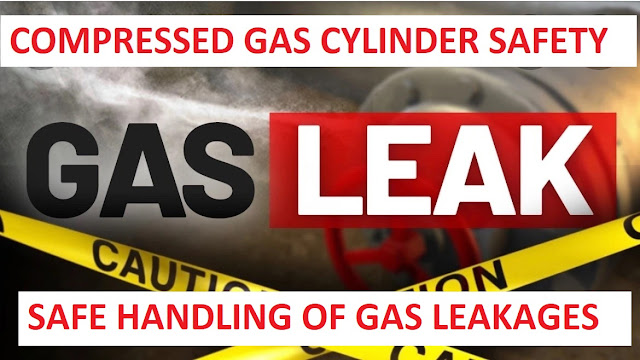Compressed gas cylinder safety |
Safe handling of gas leakages
UN SAFE ACT & CONDITION, NEARMISS
Compressed handling & storage is
one of the critical activity as it having the many hazards.
The safe handling & storage is to
be done as per the manufacturer & SDS guidelines.
Gas leakages from the gas cylinders
are very dangerous.
A gas leak can occur from any of the following points.
- Valve threads, where the valve is attached to the cylinder.
- Safety devices on the cylinder.
- Valve spindle
- Valve outlet
- Joints in pipeline or from the pipeline due to corrosion.
Precautions to be ensured,
Do not attempt to repair a leak at the valve threads (at the
base of the valve) or from
the safety device on the cylinder.
In case of a flammable gas leak extinguish any open flame if
any quickly. Do not
switch on electrical switches in the room or laboratory where
a flammable gas leak is
suspected as electric arcing can ignite the gas. Evacuate the
area.
Do not attempt to deal with a toxic/corrosive/pyrophoric gas
without proper personal
protective equipment. Wear all the required PPE. Contact
emergency support personnel for the same.
An uncontrollable leak from a
flammable/pyrophoric/toxic/corrosive gas from a
cylinder requires immediate evacuation of the building.
Ensure the wind sock direction.
WHAT IS MATERIAL SAFETY DATA SHEET (MSDS)
Use self contained breathing apparatus(SCBA) while dealing with leaks of toxic, corrosive gases or if an oxygen deficient atmosphere is suspected in case of other gases.
If the leaking gas is toxic or corrosive and the same is
inside the gas cabinet, do not
take the cylinder out.
Any gas leaking inside a non ventilated confined space can
displace atmospheric
oxygen impairing respiratory function.
An oxygen gas leak can form an oxygen enriched atmosphere
which can cause a fire
to burn violently. Extinguish any open flames in the vicinity
of an oxygen gas leak.
First aid measures
In case of contact of corrosive/toxic gas with eyes-flush
with water for at least 15
min.
In case of skin contact, remove contaminated clothing and
flush the affected part with
water. An emergency shower can be used for the same.
In case of inhalation of gas, remove the person to fresh air.
Get immediate medical attention.
Do not give anything to drink if the person is not conscious.





No comments:
Post a Comment